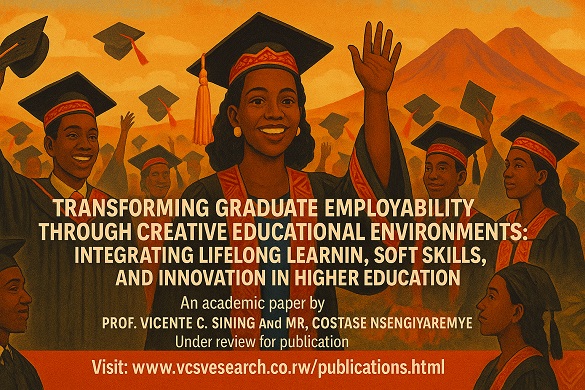
Abstract
In the face of accelerating technological change and evolving labor market demands, higher education institutions (HEIs) are under mounting pressure to equip graduates with the competencies needed to thrive in complex, non-linear career paths. This paper examines how creative educational environments—those that prioritize innovation, learner agency, and interdisciplinary collaboration—serve as critical platforms for fostering lifelong learning and soft skills, two essential pillars of graduate employability.
Building on a comprehensive review of global literature and recent policy frameworks (OECD, UNESCO, EU Key Competences), the study proposes a conceptual framework that integrates creativity, soft skills, and self-directed learning as mutually reinforcing drivers of adaptability and professional readiness. Case examples from African HEIs, including Makerere University and the University of Cape Town, illustrate how context-specific pedagogical reforms can yield measurable outcomes in student confidence, resilience, and job preparedness.
In alignment with the Journal of Teaching and Learning for Graduate Employability, the paper offers eight strategic interventions—ranging from active project-based learning to faculty capacity building—that demonstrate how HEIs can move beyond traditional didactics toward holistic, future-oriented education. The study concludes with practical recommendations for researchers, educators, and policymakers to advance inclusive, equity-driven approaches that transform employability from a fixed outcome into a lifelong capability.
Keywords: Lifelong learning, creative pedagogy, soft skills, employability, higher education, learning environments, graduate skills development
Introduction
To contextualize these global imperatives, examples from African higher education institutions such as the University of Rwanda and Makerere University in Uganda provide insight into localized efforts aimed at integrating creative pedagogy and soft skills. For instance, Makerere has implemented community-based learning modules that fuse disciplinary instruction with problem-solving in real-world contexts. Similarly, the University of Rwanda’s blended learning initiatives have begun to embed digital literacies and collaborative projects into general education curricula. These localized adaptations exemplify how institutional responsiveness to evolving labor market demands can reinforce employability and support the development of lifelong learning habits among students.
In an era defined by technological disruption, shifting labor markets, and global interconnectivity, lifelong learning—the continuous, self-motivated pursuit of knowledge across one’s lifespan—has emerged as a foundational imperative. Institutions of higher education are increasingly called upon to serve as catalysts for this paradigm. Global frameworks, such as the United Nations Sustainable Development Goals (SDG 4), urge nations to “ensure inclusive and equitable quality education and promote lifelong learning opportunities for all,” underscoring the strategic role of universities in cultivating agile, future-ready graduates.
Today’s graduates are no longer entering a linear career trajectory. Instead, they face dynamic professional landscapes marked by multiple job transitions and the need for constant skill renewal. Against this backdrop, universities are expected to go beyond disciplinary expertise, embedding within their curricula the ability to adapt, innovate, and engage across contexts. This has intensified the spotlight on soft skills—including communication, collaboration, leadership, critical thinking, and problem-solving—as core competencies for employability. As documented in multiple studies, these non-technical attributes enhance not only job readiness but also lifelong confidence and adaptability.
Concurrently, creativity —defined as the capacity to generate novel and contextually appropriate ideas—is gaining prominence as a workforce differentiator. Creative intelligence equips graduates to think beyond the conventional, navigate ambiguity, and contribute meaningfully to innovation ecosystems. The Organization for Economic Co-operation and Development (OECD) has emphasized that occupations requiring originality and complex problem-solving are the least susceptible to automation, further elevating the value of creative skills in contemporary education.
However, aligning lifelong learning, creativity, and soft-skills development within traditional higher education models remains a persistent challenge. Many HEIs still emphasize theoretical instruction at the expense of experiential, interdisciplinary, or learner-centered approaches. This disjuncture raises a crucial question: How can higher education institutions intentionally design creative educational environments that nurture lifelong learning and soft skills to strengthen graduate employability? This paper addresses this question through a critical synthesis of current literature and empirical evidence. We begin by examining the theoretical foundations and policy imperatives of lifelong learning and creativity in higher education. Next, we explore the interconnection between soft skills and employability in the global labor market. Building on this, we propose a conceptual framework that integrates these dimensions into a cohesive strategy for curricular and pedagogical reform. Finally, we present evidence-based educational practices and offer actionable recommendations for educators, researchers, and policymakers aiming to future-proof higher education.












